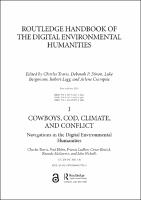Chapter 1 Cowboys, Cod, Climate, and Conflict
Proposal review
Navigations in the Digital Environmental Humanities
Author(s)
Travis, Charles
Holm, Poul
Ludlow, Francis
Kostick, Conor
McGovern, Rhonda
Nicholls, John
Language
EnglishAbstract
The DEH can be seen as an academic response to three major interwoven changes and challenges: the digital revolution; global warming and global warming and social-political agency related to environmental change. In the twenty-first century, we are challenged with a transformation in human collective intelligence. The key features of this transformation involve the “digital” replacing the “analogue”; design thinking and post-secularism supplanting tradition; and human agency emerging as the main driver of planetary change. Unlocking the keys to human perception, mitigating behavior and adaptive action may likely rank among the preeminent challenges we face in an age witnessing unprecedented rates of global change. The chapter showcases how the DEH is being applied by three international funded research projects: Larry McMurtry’s Literary Geography; NorFish (Environmental History of the North Atlantic Fisheries, 1500-1800); and the Climates of Conflict in Babylonia project.
Keywords
American literature, eco-digital geo-hermeneutics, historical North Atlantic fisheries, big data analytics, deep chart mapping, catch landing data, Fertile Crescent astronomical diaries, climate, qualitative analysis softwareDOI
10.4324/9781003082798-3ISBN
9780367536633, 9780367536695, 9781003082798Publisher
Taylor & FrancisPublisher website
https://taylorandfrancis.com/Publication date and place
2023Imprint
RoutledgeClassification
Graphical and digital media applications
Language: reference and general
Applied ecology


 Download
Download